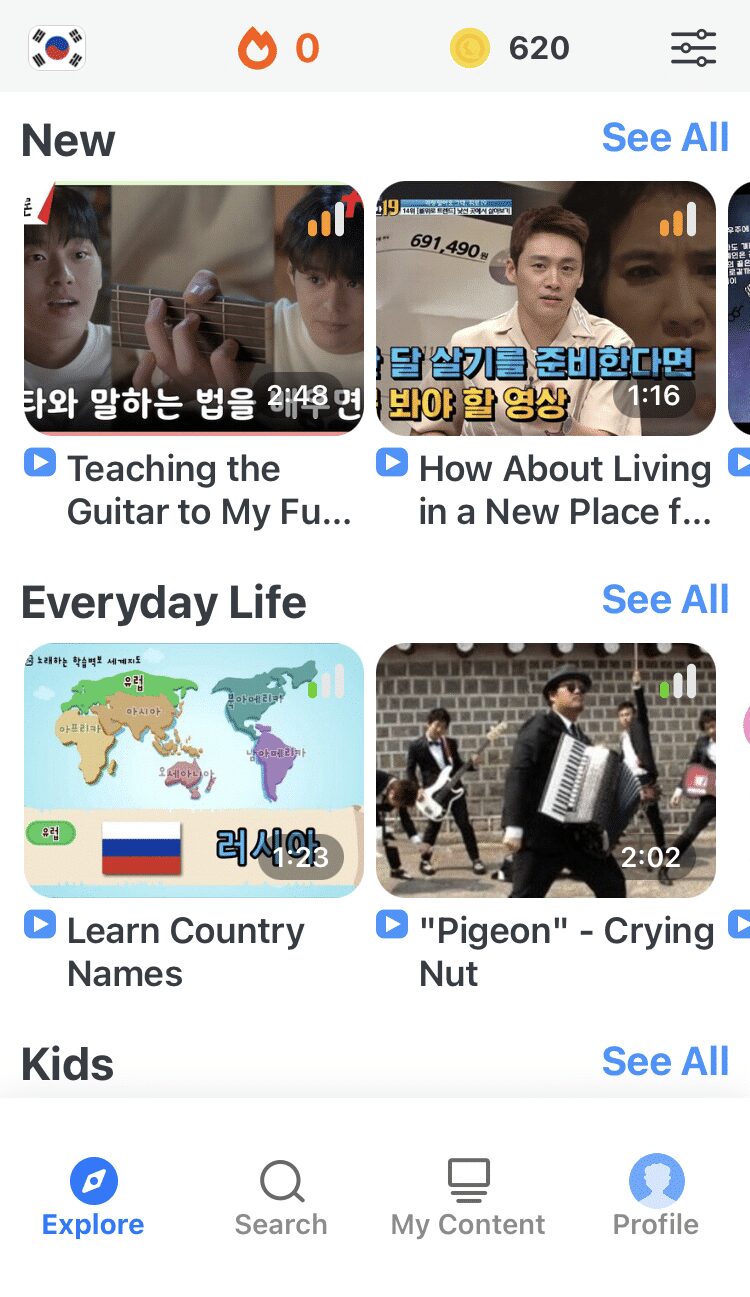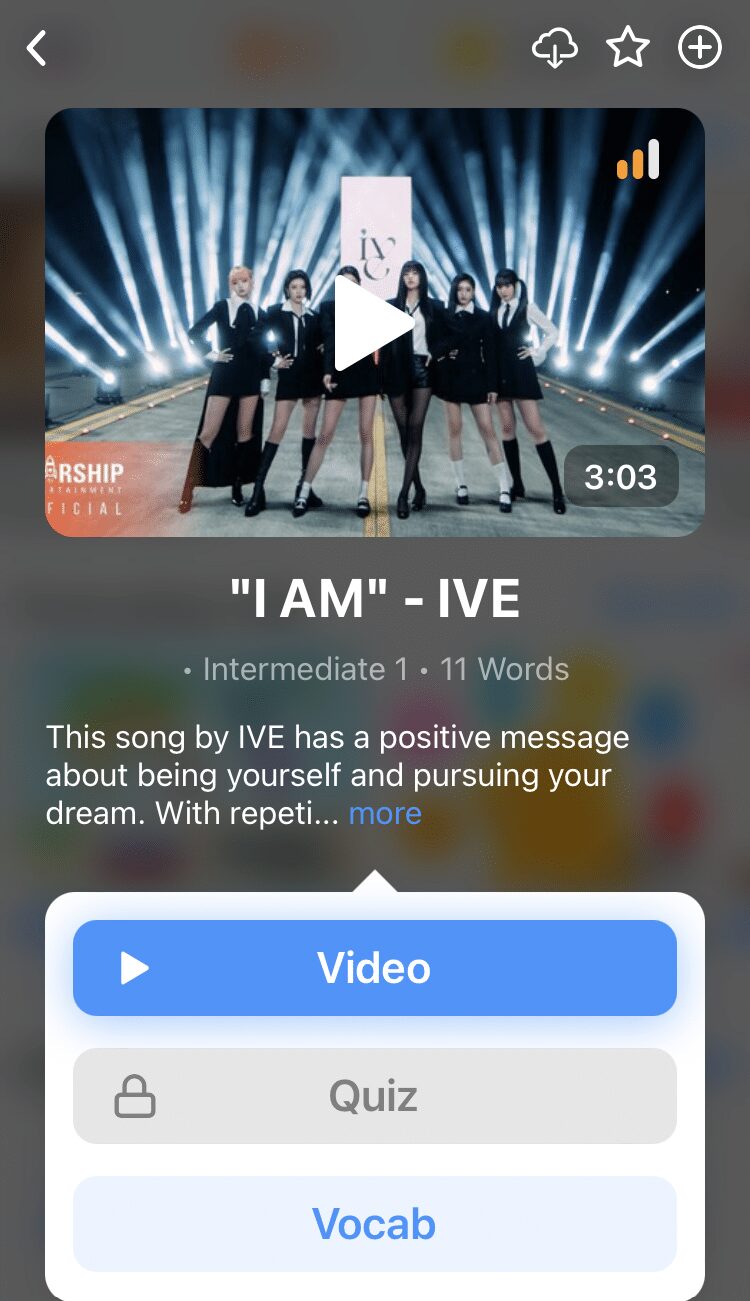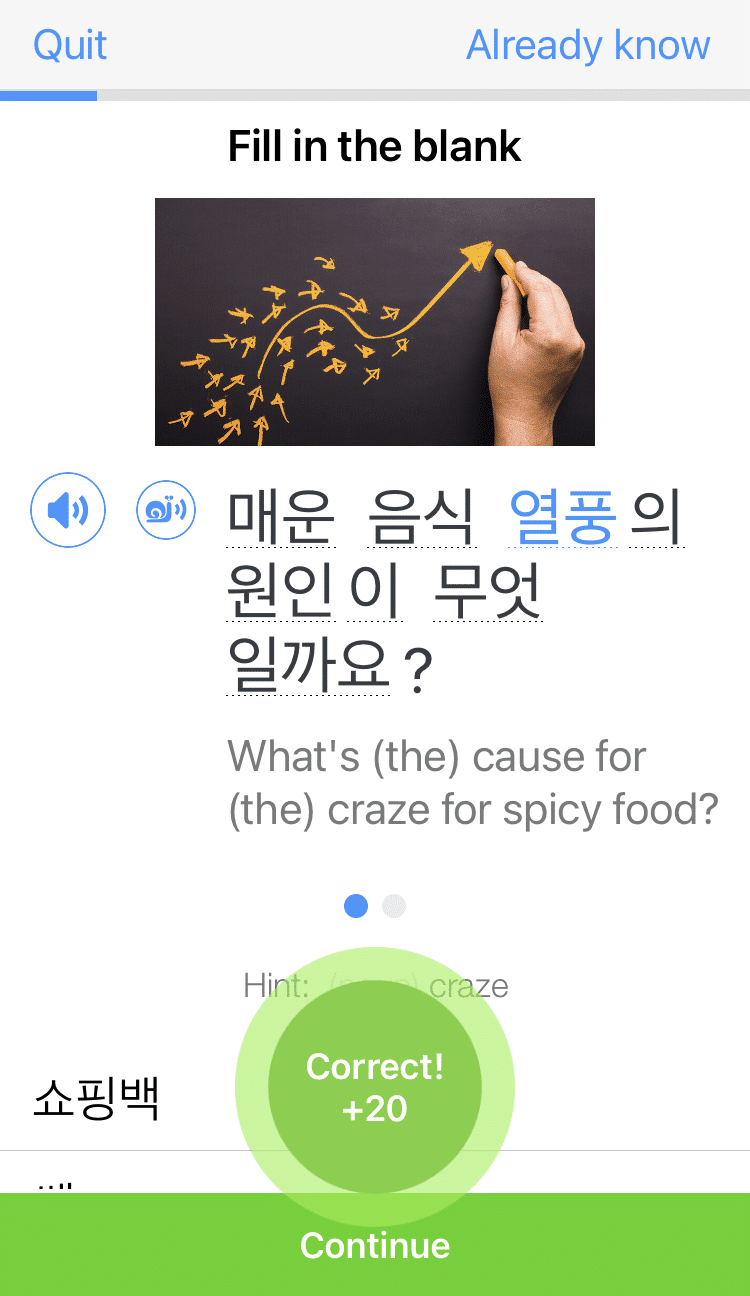Contents
- 1. 대박 (dae-bak) — Awesome
- 2. 베프 (beh peuh) — BFF
- 3. 남친 (nam-chin) / 여친 (yeo-chin) — Boyfriend/Girlfriend
- 4. 모쏠 (mo-ssol) — Never had a relationship
- 5. 치맥 (chi-maek) — Chicken and beer
- 6. 닭살 (dak-sal) — Goosebumps
- 7. 콜 (kol) — I’m in
- 8. 막장 (mak-jang) — A ridiculous situation
- 9. 아싸 (ah-ssa) — Yay
- 10. 만렙 (man-leb) — Level 10,000
- 11. 사차원 (sachawon) — Eccentric
- 12. 비번 (bee-bon) — Password
- 13. 멘붕 (men-bung) — Mental breakdown
- 14. 꿀잼 (ggul-jaem) — Enjoyable and fun
- 15. 불금 (bool-geum) — TGIF
- 16. 엄친딸 (um-chin-ddal) — Perfect girl
- 17. 썸 (ssum) — Chemistry
- 18. 프사 (peu-sa) — Profile picture
- 19. 파이팅 (paiting) / 화이팅 (hwaiting) — You can do it
- 20. 행쇼 (haeng-syo) — Peace out
- How to Practice Korean Slang
- And One More Thing...
20 Popular Korean Slang Words

Word on the street is, you wanna sound cool in Korean. That means you’ve gotta talk to native speakers like you’re one of them using 속어 (so-geo) — slang.
The 20 Korean slang terms in this post represent a healthy cross-section of the informal linguistic expressions that have entered mainstream society. Find out each term’s English meaning and usage in the post below.
You can also watch our video lesson here:
Download: This blog post is available as a convenient and portable PDF that you can take anywhere. Click here to get a copy. (Download)
1. 대박 (dae-bak) — Awesome
This expression means “Awesome!” or “Jackpot!” It should be paired with an exclamation point and some serious fist pumps. (Really!)
It’s used to express one’s exhilaration regarding the awesome thing that has just happened:
- You won the lottery? 대박!
- You just aced an exam? 대박!
- Your Korean friend says he’ll treat you for dinner? 대박!
- You found out that your Korean language tutor is as hot as Lee Min Ho? 대박!
Well, you get the idea.
2. 베프 (beh peuh) — BFF
베프 is short for 베스트 프렌드 (be-su-tu peu-ren-deu), which is the Korean appropriation of “best friend.”
Do you have a Korean friend that always treats you for dinner and is a ready shoulder to cry on? They are probably your 베프. Cherish them.
3. 남친 (nam-chin) / 여친 (yeo-chin) — Boyfriend/Girlfriend
These Korean slang terms respectively mean “boyfriend” and “girlfriend.”
Koreans love keeping their articulations short. 남친 is short for 남자 친구 (nam-ja chin-goo) while 여친 is short for 여자 친구 (yeo-ja chin-goo).
So the slang forms are sort of like how in English, instead of saying “boyfriend” or “girlfriend,” you might use “bf” and “gf” instead.
4. 모쏠 (mo-ssol) — Never had a relationship
This term means someone who has never had a boyfriend or girlfriend.
Again, it’s a shortened form of the full phrase: 모태 솔로 (mo-tae-sollo), or literally, “solo since being in mother’s womb.” And there’s nothing wrong with that!
5. 치맥 (chi-maek) — Chicken and beer
Chicken and beer is the perfect companion for those cold Seoul nights, and it’s a combo that has exploded onto the food scene in the past few years.
The phenomenon can be traced back to the hit Korean romantic-comedy series “My Love from the Star,” where actress Jun Ji-hyun played a chicken-and-beer-loving character.
Fans’ response to the sight of her holding chicken in one hand and beer in the other was electric. People queued for hours just to order spicy fried chicken. Chicken-themed stalls and restaurants mushroomed all around the country.
The 치맥 wave even hit China, where the show was also a certified hit!
6. 닭살 (dak-sal) — Goosebumps
Well, speaking of chicken, this expression literally means “chicken skin.” This slang can be used for something spooky, just like “goosebumps” in English is associated with something that gives you the chills.
This expression is also often a reaction to something cheesy—like when your lovey-dovey friends publicly show affection and you’re the unwanted third wheel.
7. 콜 (kol) — I’m in
This is probably said by Korean teenagers right before they get into trouble by doing something like wrecking the car or skipping classes and going on a drinking spree. It’s like saying “I’m in!” or “Sure!”
콜 is the Koreanized pronunciation of the English word “call,” used to signify that the person who said it is game. It can also be used for trivial matters, like when your friends ask you if you’re going to the movies with them—“콜!” means that you’re in and you’re definitely going.
8. 막장 (mak-jang) — A ridiculous situation
막장 is a situation so ridiculous it couldn’t possibly get any worse. Basically, it’s a term used for a situation so patently outrageous it could only happen in a TV drama.
An example would be “Temptation of Wife,” which features a woman who was not only cheated on by her husband but also left to drown at sea, while pregnant! She survived, and now she’s out to get revenge on her husband and his mistress, by playing a different character. 막장!
9. 아싸 (ah-ssa) — Yay
Like our first term, this one also requires some serious fist pumps. It’s the equivalent of “Oh yeah!” or “Yay!” in Korean.
The airline found your lost bag? 아싸! You got upgraded to the suite room? 아싸! “You are not the father!” 아싸!
10. 만렙 (man-leb) — Level 10,000
This refers to a person who’s so good at something they’re on the nth level, literally “max level.”
The idea is taken from online gaming, where levels signify the skill and expertise of your character. The maximum level in “World of Warcraft,” for example, is 110. So to be level 10,000 is just ridiculous.
If someone says this of you, it is a superlative that indicates you’re far above others in a certain skill—but it could be anything from boxing to racing to licking stamps.
11. 사차원 (sachawon) — Eccentric
Literally, this Korean slang is an adjective meaning “4D.” A four-dimensional person is one who’s unique. The eccentricity might refer to their personality, the way they dress or their way of thinking.
It may sound a bit insulting, but it’s not. Many Korean celebrities are considered 4D by their fans, and this eccentricity makes them endearing to the masses. Consider T.O.P. of music group Big Bang or celeb Yesung.
So if your Korean friends call you 사차원, they think you’re eccentric… in a good way!
12. 비번 (bee-bon) — Password
Another shortened term, 비번 comes from 비밀번호 (bee-mil-bon-ho), which literally means “secret number.”
Note that another way to say “password” is 암호 (am-ho).
13. 멘붕 (men-bung) — Mental breakdown
멘붕 is short for 멘탈붕괴 (men-tal bung-goe), which literally means “mental breakdown.” It refers to the mental state of a person who just had a pretty negative experience. Some situations that might cause 멘붕 include:
- Finding out over Facebook your crush just got into a new relationship.
- Finishing a four-hour statistics exam, and not knowing if you passed.
- Your laptop crashing when you have no backup files.
14. 꿀잼 (ggul-jaem) — Enjoyable and fun
Literally, this expression means “honey fun.” When you describe something enjoyable, interesting or awesome, you say it was 꿀잼. It can refer to the date you went on last night, or a movie you saw with a friend.
But what about when your date was about as fun as going to the dentist? Or when the “horror” movie you saw had you sleeping instead of shouting? You can say “boring” and “no fun” with the opposite term: 노잼 (no jaem).
15. 불금 (bool-geum) — TGIF
Anybody who has worked for a living can relate to this feeling. 불금 is the short version of 불타는 금요일 (bool-ta-neun geum-yo-il), or “Burning Friday,” the yearning for the last day of work before the weekend.
And because life is composed of yin and yang, there’s another Korean slang word that refers to employees’ tendency towards office escapism. It’s 월요병 (wol-yo-byung), or “Monday sickness,” the feeling you get when you’re faced with another week at the office.
16. 엄친딸 (um-chin-ddal) — Perfect girl
Ever met a woman who’s got everything: looks, brains, money? She’s awesome at her job and she’s got her life together. She’s 엄친딸, literally “mom’s friend’s daughter.” And your mom wants you to be like her.
Korean mothers love to compare their daughters with those of their friends. And their poor daughter pretty much never wins: “Her daughter went to Harvard and has a boyfriend who’s a doctor. They’re going to get married this year! She just got promoted and was also featured in a popular magazine!”
And life’s not fair all around. Boys have their own version of this concept, a Ken-doll type. He’s 엄친아 (um-chin-ah) or “mom’s friend’s son.” This guy eats death threats for breakfast.
17. 썸 (ssum) — Chemistry
Literally “some,” 썸 is the “something” that happens before becoming lovers.
It’s the thrill of the chase, the excitement of doing new things with a potential partner. It’s the push-and-pull of courtship. It’s the intricate and intoxicating dance between would-be lovers. It’s chemistry.
18. 프사 (peu-sa) — Profile picture
프사 is that infamous profile picture. Gotta look cool, gotta look happy, gotta look well-traveled. So you gotta ask a friend to take the perfect shot.
For other pictures, however, a 셀카 (sel-ka) will do. This is short for “self-camera,” or a selfie.
Then, upload these to 페이스북 (pe-i-su buk), or Facebook, so all your friends can “like” it and comment on how much they envy your perfect life.
19. 파이팅 (paiting) / 화이팅 (hwaiting) — You can do it
This is a cheer you’ll often hear during sports events or to boost the morale of a person about to undergo a tough task.
파이팅 is actually Konglish, rooted in the English word “fighting.” It’s an expression of support and can be roughly translated as “C’mon!” or “You can do it!”
Note that you’ll find 파이팅 more commonly used in standard written Korean, while 화이팅 is the spoken form. (Of course, native speakers can understand you either way.)
20. 행쇼 (haeng-syo) — Peace out
This term was popularized by K-pop idol G-Dragon. 행쇼 is short for 행복하십쇼 (haeng bok ha sip syo), which means “Be happy!” but is used to say “Goodbye.”
You can say this as you leave a group of friends at the end of the night. It can roughly be translated as “Peace out!” (Mic drop optional.)
How to Practice Korean Slang
When a father scratches his head because he doesn’t understand 70% of what his teenage son just said, that’s probably because of slang!
Typically pioneered by younger generations, slang terms are used by certain people to prove that they’re in the know, or that they belong. And dad doesn’t have to know all the new-fangled slang because, really, he’s not supposed to know—he doesn’t belong to that (age) group.
But whether you’re a teen yourself, the parent of a teen or something else altogether, learning Korean slang will help you connect better with both the Korean language and its culture.
This is the Korean you’ll hear in the streets, outside the textbooks and language labs. It’s how the average Korean talks.
The first way to practice Korean slang is to learn to recognize it when you hear it. For this, you can use:
On YouTube, vloggers will be a particularly likely source for slang usage, but anything focusing on younger people has a higher chance of including modern Korean slang terms (and Korean curse words!).
If you’re a beginner or just not very confident in your listening skills, however, all that Korean coming at you may seem overwhelming. If that’s the case, you can consider using the immersive learning platform FluentU to help you out.
FluentU takes authentic videos—like music videos, movie trailers, news and inspiring talks—and turns them into personalized language learning lessons.
You can try FluentU for free for 2 weeks. Check out the website or download the iOS app or Android app.
P.S. Click here to take advantage of our current sale! (Expires at the end of this month.)
Watching videos and listening to real Korean content will help you learn how to use slang properly. That’s because, often, slang is playful with the language. It tinkers with grammar rules and is usually rooted in recent cultural developments.
Once you’ve listened to examples, remember to try using your new terms in conversation.
Unlike Korean text slang, which obviously lends itself to written communication, you’ll especially want to practice the above terms while talking aloud, like with a language exchange partner or Korean friend.
And luckily, unlike the teenager who doesn’t want dad to be in on the lingo, Koreans are a very welcoming people and most would love to help you learn more about the slang they use in everyday conversations!
Remember that Korean, like any language, is continually evolving.
That means you can always be on the lookout for new slang terms, but these are a great place to get started.
So good luck as you continue with your Korean language studies. You can do it! 파이팅!
Download: This blog post is available as a convenient and portable PDF that you can take anywhere. Click here to get a copy. (Download)
And One More Thing...
If you enjoyed this post, you're already halfway to having the time of your life learning Korean with FluentU!
FluentU makes it possible to learn with K-pop videos, funny commercials, entertaining web series and more. Just a quick look will give you an idea of the variety of FluentU videos on offer:

FluentU really takes the grunt work out of learning languages, leaving you with nothing but engaging, effective and efficient learning. It's already hand-picked the best videos for you (which are organized by level and topic), so all you have to do is simply choose any video that strikes your fancy to get started.
Each word in the interactive captions comes with a definition, audio, image, example sentences and more.

Access a complete interactive transcript of every video under the Dialogue tab, and easily review words and phrases from the video under Vocab.

You can use FluentU’s unique Quiz Mode to learn the vocabulary and phrases from the video through fun questions.

FluentU keeps track of what you're learning, and tells you exactly when it's time for review, giving you a 100% personalized experience.
Review sessions use video context to help embed the words in your memory.
Start using the FluentU website on your computer or tablet or, better yet, download the FluentU app from the iTunes or Google Play store. Click here to take advantage of our current sale! (Expires at the end of this month.)








